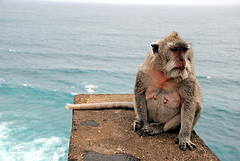
Scientists in Indonesia recently published a paper documenting their field observations of long-tailed macaques going fishing. Even better, they don’t just reach into the water to grab their own fish—they watch other macaques at work and learn from their techniques. One researcher theorized that “perhaps a couple of generations back, one primate caught a fish and it was subsequently copied.” The scientists suspect that the macaques fish when no other food is available, though they stress that not enough data exists to say for certain.
Okay, so this is cool. It’s not often that we see species adapt to changing conditions at a rate that matches the change. (Recovery from human threat and habitat depletion is rare enough.) Further study of this species could teach us a lot, not only about how macaques adapt to changing conditions, but about how we might adapt as well. Unfortunately, if Congress is any indication of how we’re doing, right now the macaques are coming out ahead.
Photo used under a Creative Commons license from sebr.








